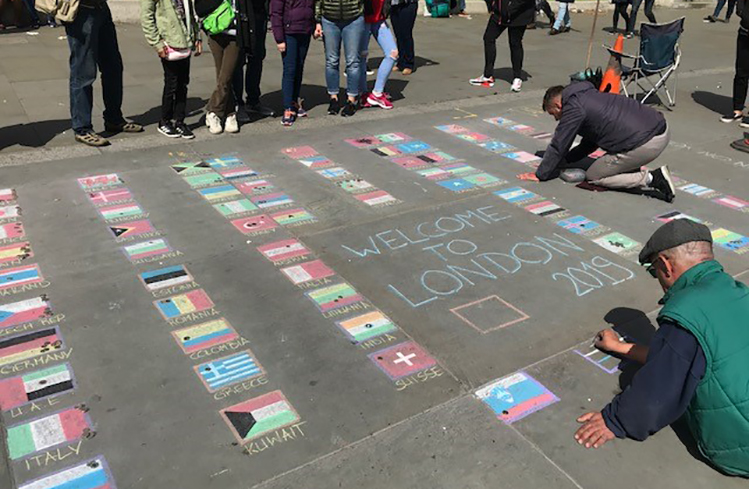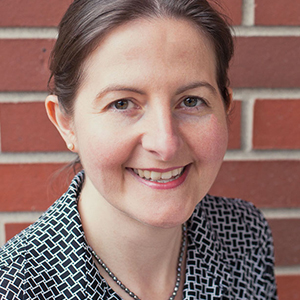

Technology Comms Across the Pond: A Q&A with Benito Leyva
Travel shifts our perspective, the lens through which we view the world. For more than 10 years, the WE Global Exchange program has provided an opportunity for employees to explore, learn and connect through travel by spending up to four weeks in another of our 23 global offices. This year, 12 WE employees are embarking on professional journeys that immerse them in new cultures, help them build lasting relationships with colleagues abroad and provide opportunities for both personal and professional exploration.
WE employee Benito Leyva recently completed his Global Exchange — traveling from his home in Austin, Texas to spend four weeks with our WE team in London, England. Benito shared with us some of his learnings and perspectives from his Global Exchange experience and how it has changed his life — as a traveler, communicator and global citizen.
WE: What drew you to apply for WE’s Global Exchange program?
When I first applied to be an intern, one of the biggest appeals of the agency was that a global mindset underpinned everything we did as a company. I couldn’t have been certain at the time that I would have as big a role working with global colleagues and clients as I do today; however, the desire to connect with people from different offices, with unique cultures and varying perspectives was always an aspiration of mine. After hearing stories from Global Exchange alumni about their trips and learnings, it only seemed natural to apply and try to broaden my own outlook on living and working globally.
WE: Why did you pick London?
The UK is such an interesting hub for deep tech. Many influential reporters cover the most complicated tech issues of our day — from cybersecurity to Artificial Intelligence and Machine Learning — from the UK. And TechNation framed up the UK’s leadership in tech with research that places the market first in fintech investment and fourth in scale-up investment behind only the US, China and India. It’s also a unique market for exploring a cross-hatching of different tech influences, from politics and policy to ethics and corporate citizenship, and the intersection of different verticals like tech and healthcare. London and the United Kingdom as a whole have a special complexity and growing potential to be an influential intermediary between markets. Learning how to communicate in the UK has a lot of value in evolving the way we communicate here in the U.S., especially around technology.
WE: What was the most profound part of your experience living overseas?
A very profound part of my time spent in London has been the adaptation of my day-to-day experience. Most of my time in London has been spent walking, which is in stark contrast to the driving culture in Texas where the distances are vast and the weather can be brutal. The need to walk brings about a whole new appreciation of your surroundings, it ignites a desire to explore, and I found it to be relaxing. I’ve stumbled upon exciting food, taken the longer walk home to enjoy the view from the River Thames and spent time admiring the old buildings made new again that keep London alive and vibrant. It’s a new outlook on my day-to-day living. For a short time I traded in my view of rolling hills and blue bonnets from the car for cobbled streets on my walk.
WE: What part of the British culture surprised you?
I’ve been pleasantly surprised by the cultural dedication to a work/life balance. It was refreshing and very welcomed to be able to join others in stepping away to get lunch as a group or coming together ad hoc after work to go to a pub. It’s a facet of relationship building and general wellbeing that we often set aside in North America. My colleagues in London work as hard and are as dedicated as any group I’ve seen in my time at WE. That’s a big reason why I can admire, and was delighted to participate in, the social activities that keep the culture and wellbeing of this office strong.
WE: One thing travel tends to do for people is it shifts their perspective. What experiences in your life have shaped your world view? And how has the Global Exchange experience shifted or transformed your perspective?
My decision to branch out for school and move to Austin was a very transformative experience in my life. Growing up in a desert border town was almost nothing like becoming a young professional in the hill country of the booming Austin tech scene. When you think of the distance between those two points it is actually pretty far, but nothing prepares you for the realization of just how narrow your worldview can be until you leave the continent.
It takes living and experiencing new places and unique times to open yourself up to a much broader view of the world. In just four weeks, I’ve seen my first pieces of art from Da Vinci and Van Gogh, experienced what it’s like to be in an earthquake at the Science Museum, grabbed food on the go from famous open-air markets like Borough Market, cried and cheered with English fans supporting their football clubs during the Champions League semi-finals, and even talked policy and politics over fish and chips. It’s a big world, and the only way to get to know it is to go and be a part of it.
WE: What did the short-term experience of living abroad teach you about US culture?
The US is one piece in a very large and complex puzzle. Two oceans and many time zones apart, the US can be quite centralist in the way the country sees its role in global matters. That was a huge strength for the country early in our history and in the development of our culture, but the speed of communications and business has changed drastically. Collaboration will be key in the country’s path to growth. We have to take cues from others, know when to lead and when to follow, and show that we can listen and act globally.
WE: What did you learn about similarities and differences in communications in the UK compared to US?
One of the biggest similarities between the way the US and UK communicate is the desire to be better integrated. We approach our work thinking about the potential integration points and counseling others on how to achieve broader impact and success across all available communication channels. It’s a core desire to be holistic about what we communicate.
In terms of differences, the US works slower and feels a consistent tension to balance speed and perfection in how we communicate. The UK operates with more pace. Communications are a bit more direct and clear about needs and outcomes, but it also assumes shared context that might not always be clear. There are lessons to learn from both ways of communicating, and it becomes a skill to communicate in those ways with different teams in both the US and UK.
WE: What advice do you have about the role of travel and overseas experiences for professionals?
Come ready to listen and open to learning. You have to set aside your presumptions and expectations and be willing to see and experience things from a completely new place. Whether its professional or personal, immersion into a new culture or location is so important. You can’t try to understand where others are coming from, unless you’re also willing to listen, learn and try to live it as well.
And, most importantly, have fun! Work is such a huge part of our lives, but traveling overseas is a unique chance to know when the workday ends and where the time for adventuring begins.
Follow #InsideWE and #WEGlobalExchange on social media for another view into Life at WE.
The latest blogs from WE
R&D has a Crucial Role in Shaping Corporate Reputation
Holiday Shopping Recap: Key Insights From Our Consumer Team
The Future of Earned Storytelling


